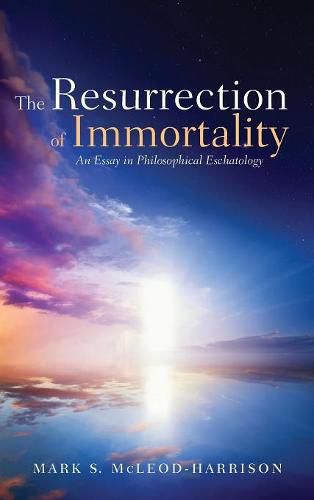Readings Newsletter
Become a Readings Member to make your shopping experience even easier.
Sign in or sign up for free!
You’re not far away from qualifying for FREE standard shipping within Australia
You’ve qualified for FREE standard shipping within Australia
The cart is loading…






This title is printed to order. This book may have been self-published. If so, we cannot guarantee the quality of the content. In the main most books will have gone through the editing process however some may not. We therefore suggest that you be aware of this before ordering this book. If in doubt check either the author or publisher’s details as we are unable to accept any returns unless they are faulty. Please contact us if you have any questions.
If humans are not capable of immortality, then eschatological doctrines of heaven and hell make little sense. On that Christians agree. But not all Christians agree on whether humans are essentially immortal. Some hold that the early church was right to borrow from the ancient Greek philosophers and to bring their sense of immortality to bear on the interpretation of biblical passages about the afterlife. Others, however, suggest that we are inherently mortal, and only conditionally immortal. This latter view is usually associated with an annihilationist interpretation of the doctrine of hell and a rejection of eternal torment. In a philosophical analysis and argument, McLeod-Harrison proposes that humans are, indeed, immortal, but not essentially so. But neither are we immortal accidentally or conditionally. Instead, immortality is an enduring property–a property we cannot lose once created. McLeod-Harrison carefully delineates the sense of immortality he defends and provides a broadly Christian philosophical argument for it. The argument, if correct, leaves the recent suggestion that the unredeemed are annihilated on unsteady metaphysical feet. However, McLeod-Harrison does not defend eternal conscious punishment for the unredeemed, but suggests some ways to think about the possibility of a universal salvation.
$9.00 standard shipping within Australia
FREE standard shipping within Australia for orders over $100.00
Express & International shipping calculated at checkout
This title is printed to order. This book may have been self-published. If so, we cannot guarantee the quality of the content. In the main most books will have gone through the editing process however some may not. We therefore suggest that you be aware of this before ordering this book. If in doubt check either the author or publisher’s details as we are unable to accept any returns unless they are faulty. Please contact us if you have any questions.
If humans are not capable of immortality, then eschatological doctrines of heaven and hell make little sense. On that Christians agree. But not all Christians agree on whether humans are essentially immortal. Some hold that the early church was right to borrow from the ancient Greek philosophers and to bring their sense of immortality to bear on the interpretation of biblical passages about the afterlife. Others, however, suggest that we are inherently mortal, and only conditionally immortal. This latter view is usually associated with an annihilationist interpretation of the doctrine of hell and a rejection of eternal torment. In a philosophical analysis and argument, McLeod-Harrison proposes that humans are, indeed, immortal, but not essentially so. But neither are we immortal accidentally or conditionally. Instead, immortality is an enduring property–a property we cannot lose once created. McLeod-Harrison carefully delineates the sense of immortality he defends and provides a broadly Christian philosophical argument for it. The argument, if correct, leaves the recent suggestion that the unredeemed are annihilated on unsteady metaphysical feet. However, McLeod-Harrison does not defend eternal conscious punishment for the unredeemed, but suggests some ways to think about the possibility of a universal salvation.